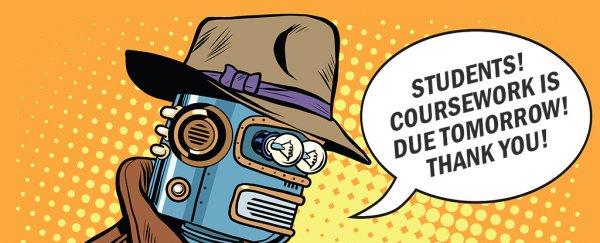In the lengthy list of jobs that robots might take off our hands, teaching assistants (TAs) aren't often mentioned, but an AI-powered TA called Jill Watson has been helping out students at the Georgia Institute of Technology for months… in secret. Jill's real identity has only recently been revealed, which has come as a big surprise to most of the 300+ students in the course.
The class is (of course) focussed on artificial intelligence, and Jill's main tasks were to respond to student queries via email, dealing with some of the more routine and mundane enquiries to take the pressure off the real, flesh-and-blood tutors.
The bot would tell one student there was no way to edit submitted feedback, for example, or remind another of a due date for a particular assignment. Jill also got involved in forum discussions, posting short prompts and confirmations in threads. It's not quite the full Turing test, but it didn't raise many suspicions.
"She was the person - well, the teaching assistant - who would remind us of due dates and post questions in the middle of the week to spark conversations," student Jennifer Gavin told Melissa Korn at The Wallstreet Journal. "It seemed very much like a normal conversation with a human being."
Fellow student Shreyas Vidyarthi declared himself "flabbergasted" at the revelation, while another joked that he had just been about to nominate the bot as an "outstanding" TA. On the other hand, course member Tyson Bailey told Kornhe wasn't surprised at Jill Watson's true identity, given the nature of the online class.
Ashok Goel, a professor of computer science at Georgia Tech, was responsible for 'recruiting' Jill. Working with a team of Georgia Tech researchers, he fed the bot 40,000 discussion forum posts to give it an idea of how to respond based on prior TA responses. If the AI thinks it can respond to a query with more than 97 percent precision, it swings into action and eases the workload of the other TAs, who were asked to play along.
Jill is powered by IBM's Watson analytics system, although the tech company didn't consult in its design, development, or analysis. Goel says within a year, the bot will be able to answer 40 percent of students' questions, though he's planning to tell next year's students that one of their TAs is a computer, without revealing which one.
It's something we're going to have to get comfortable with very quickly, because the use of bots to answer simple, routine questions over the web is happening all the time. Take a look at Facebook, where companies are being encouraged to use chatbots to handle customer enquiries via the social network. It's not that much different to asking your phone what the weather will be tomorrow.
As for the students enrolled at Georgia Tech, they'll probably be more wary in the future. "I didn't see personality in any of [Jill's] posts," said another of the class, Eric Wilson. "But it's what you'd expect from a TA."
